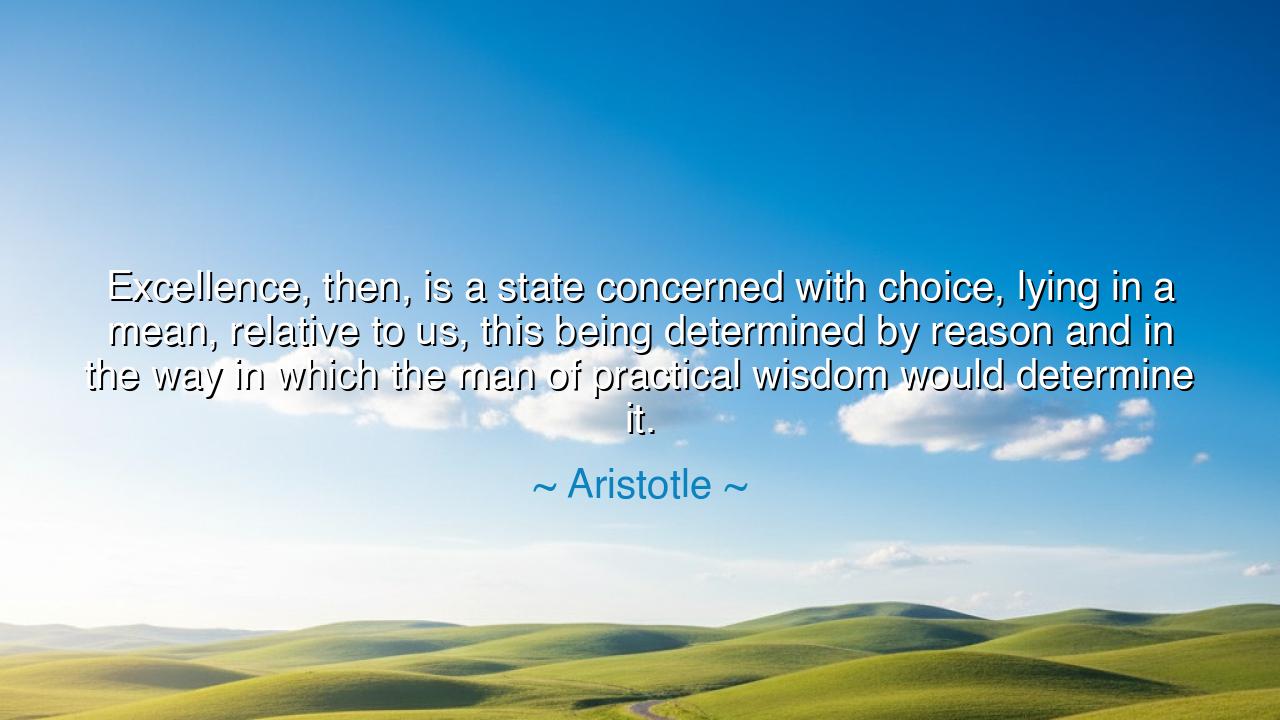
Excellence, then, is a state concerned with choice, lying in a
Excellence, then, is a state concerned with choice, lying in a mean, relative to us, this being determined by reason and in the way in which the man of practical wisdom would determine it.






The voice of Aristotle, the master of those who know, proclaims that “Excellence, then, is a state concerned with choice, lying in a mean, relative to us, this being determined by reason and in the way in which the man of practical wisdom would determine it.” These words echo through the ages as a guiding star. For excellence is not a gift of fortune, nor the property of the few; it is a state, shaped by the deliberate choices of the soul, tempered by reason, and measured by wisdom.
The Stagirite teaches us that every virtue is found not in extremes, but in the mean—the noble balance between excess and deficiency. Courage, for example, is not the madness of recklessness nor the cowardice of retreat, but the steady heart that faces danger with measure. Generosity is neither wasteful extravagance nor grasping stinginess, but the wise giving of one’s means. Thus, excellence is not wild fire, nor dead ash, but the enduring flame that burns steadily because it is governed by practical wisdom.
The meaning of this truth shines in the life of George Washington, who in victory could have seized the crown and made himself king. Many would have praised him had he clutched power with a tyrant’s hand; others might have judged him weak had he abandoned leadership entirely. Yet he chose the mean, laying down authority when the time was right, thus becoming not a tyrant but a founder, not a ruler by force but a father of liberty. His choice was not made by passion alone, but by reason, guided by the wisdom of what would endure for generations.
The ancients knew that the path of virtue is narrow, flanked on both sides by the abyss of extremes. To walk it requires discipline of mind, control of desire, and the counsel of practical wisdom. It is not enough to feel what is right; one must also judge what is right in the particular moment, for the mean is not the same for all men nor in all times, but is always “relative to us.”
Therefore, children of the future, learn this: excellence is not born in the heat of one choice, but in the daily practice of balanced judgment. Let your heart be steady, your mind be clear, and your spirit be disciplined. Seek not the empty glory of extremes, but the enduring honor of the mean, where reason governs, and where the man or woman of practical wisdom would walk. For there, and only there, is found the crown of true greatness.






_T_27_Phu Trong
This quote challenges me to reconsider how I view excellence. Aristotle seems to suggest that excellence isn’t about chasing unattainable ideals but about finding balance through reason. However, I wonder — do all people have access to the same level of practical wisdom to guide their choices? What happens if someone isn’t as skilled in using reason to find that balance? Does this mean excellence is out of reach for some, or is it always attainable?
HQhoa03121999 Quan
What stands out to me in Aristotle’s view is that excellence is a state achieved through reasoned choice, not just instinct or desire. It makes me think — how often do we act without considering this balanced approach? In a world that often pushes for more or less, how do we develop practical wisdom to know what the ‘mean’ should be in different aspects of life? I think this is a constant struggle to find equilibrium.
GNGam Nguyen
This quote highlights that excellence isn’t just about striving for the best outcome but about making choices within a balanced and reasonable approach. I’m curious, though — is the ‘mean’ the same for everyone, or does it vary depending on individual circumstances and values? How do we determine what’s ‘excellent’ for us personally, versus what society or others expect from us? Can excellence be truly subjective, or is it a universal ideal?
CNquynh chi nguyen
Aristotle’s view that excellence lies in a ‘mean’ that is determined by practical wisdom feels like a reminder to avoid extremes. I wonder if this is achievable in modern times, where success is often measured by outliers — the extreme cases of greatness. Can we redefine excellence as balance rather than excess? Is practical wisdom enough to navigate all situations, or do some moments call for more intuition and less reason?
YNNguyen Yen Nhi
I find this quote to be both practical and philosophical. Aristotle suggests that excellence isn’t a static goal, but rather a process shaped by choice and reason. It makes me reflect on how we often think of excellence in fixed terms, but it’s more about the journey than the destination. But what about when we face decisions that don't have a clear ‘mean’ or balanced choice? Can excellence still be achieved when the path is unclear?